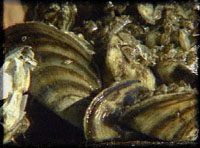No Thanks! Zebra Mussels Come to Big McKenzie Lake and NW Wisconsin
Public asked to report zebra mussels and other invasive species to prevent the spread
By Wisconsin Lakes staff
Big McKenzie Lake property owners and indeed everyone in NW Wisconsin face a thankless realization this holiday week. Early in November, according to DNR, a property owner on the lake found zebra mussels attached to his pier. Additional mussels were later found at a water intake and attached to a boat lift.
The finding is significant as it is the first inland zebra mussel population verified in northwest Wisconsin, according to DNR. The agency already committed a $20,000 early detection and response grant to the McKenzie Lake Association, and will host an informational meeting along with partners in the county on Thursday, Dec 1 from 6:30 to 8 p.m. at the Spooner Agricultural Research Station (W6646 WI-70, Spooner, Wis. 54801) to discuss the find.
In a press release, DNR Lake Biologist Pamela Toshner said the discovery reinforces the need for boaters to take action to stop aquatic invasive species, especially in NW Wisconsin where lakes are free of most invaders. “All boaters have the ability to stop the spread of invasive species by removing plants and draining water before leaving the boat landing,” she said, “and anyone who enjoys area lakes can help by keeping an eye out for invasives.”

A mass of zebra mussels
Fingernail-sized bottom-dwellers native to Europe and Asia, zebra mussels are an invasive species that can displace native species, disrupt ecosystems and hamper recreation. A ballast water exchange of an ocean-going ship most likely introduced zebra mussels to the Great Lakes from Europe in the mid-1980s. Fortunately in Wisconsin, fewer than 5 percent of lakes deemed suitable for colonization actually have zebra mussels.
DNR is encouraging lakeshore property owners, contractors, anglers and hunters to keep an eye out for the invaders, which resemble small clams with a yellowish or brownish D-shaped shell and alternating dark- and light-colored stripes. Most are under an inch and they frequently grow in clusters attached to pier posts, boat lifts, rocks and other hard surfaces.
To learn more about the finding of zebra mussels in Big McKenzie Lake, what to do if you discover them in your lake, and Wisconsin boaters’ responsibilities under the law, check out this article from DNR.

